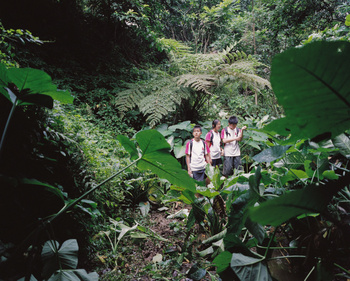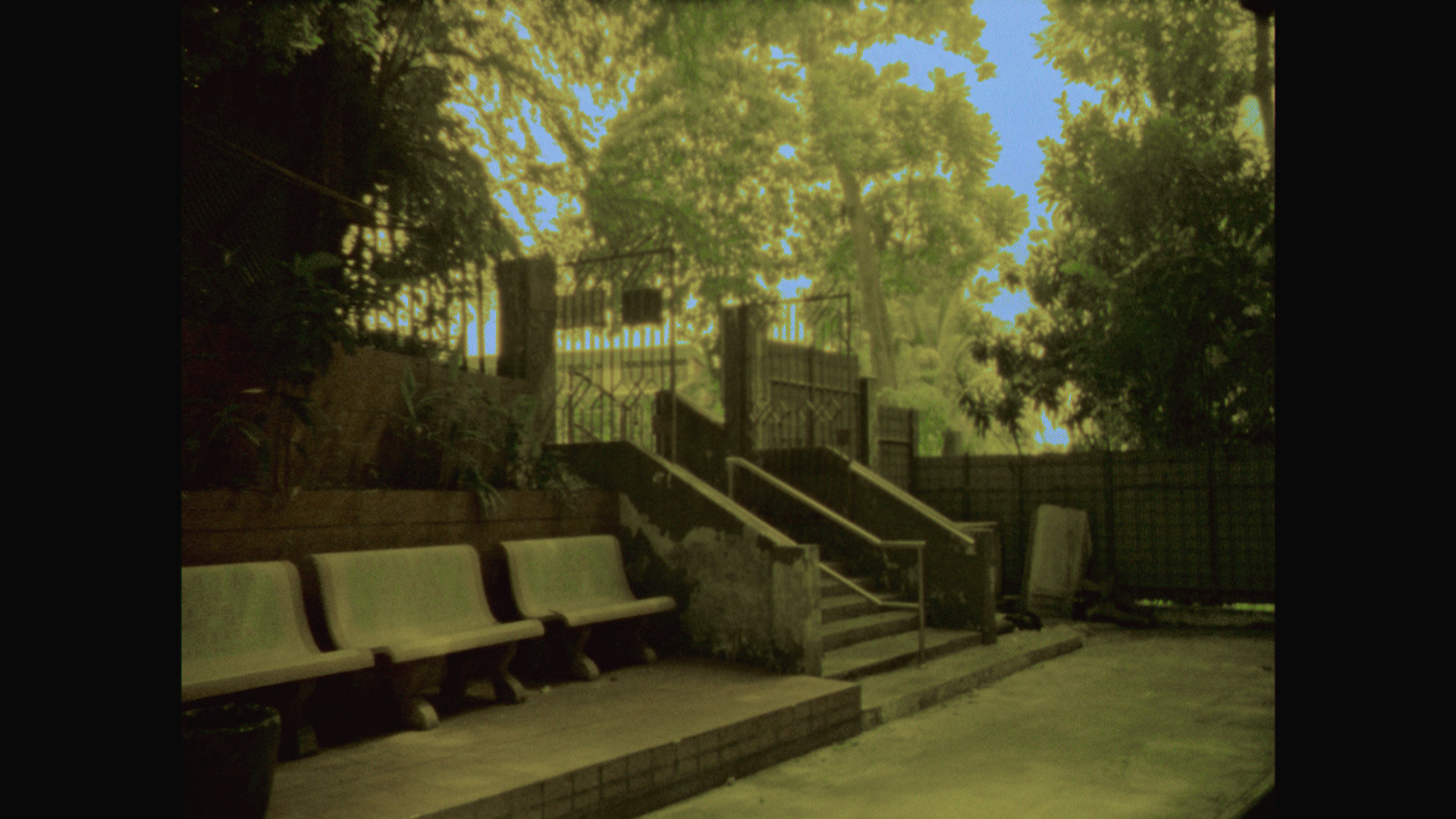A collection of conversations with a diverse range of local and regional creatives
Library Conversations for SGABF2020
We examined the systems that support art book making and independent art book publishing in Singapore and the region.
A Closer Look for SGABF2019
We gathered perspectives on our zine and art book culture, and discuss the possibilities of self-publishing today.
21 Creatives for SGABF2018
We sat down with 21 creatives of various disciplines to learn about their practice and asked each of them to fill up a blank page in a notebook.
SGABF: You mentioned in an interview about your difficulty with categories, and how you think that the work that you do is not “directing” in the traditional sense of the word. What is filmmaking to you and what is the philosophy behind your work?
Liao Jiekai (LJK): I define myself as someone who works with the moving image. It involves narratives and stories sometimes, and other times they are more abstract because it is about emotions or just images. I think I have an unorthodox approach to filmmaking because of my background in visual arts. I did not come into the arts just to do film. There are ways to show your work, for instance, if you make an artwork, you show it in a gallery or museum, and if you make a movie, you screen it in the theatre. I sometimes have to tailor my work to fit these presentation formats.
Philosophy is not something I think about, but I draw my inspiration from very personal sources. A good friend of mine, Elysa Wendi — a dancer, artist and filmmaker — took a workshop in Brussels with a very well-known Hungarian director, Béla Tarr, and one of the first things he did was to tell the class to not be philosophers. He said that if you are a filmmaker, you should talk through your work. If you want to talk about your ideas, be an academic. I do see a lot of sense in that. For me, what I want to say is through my work, other people are free to interpret or make sense of it.
SGABF: You quoted Jonas Mekas on your own website, and the same quote appears along with another quote by John Cassavetes on 13 Little Pictures. The recurring theme seems to be on how filmmaking is an art, and how we should think about it beyond commercialising and commodifying. How does that belief play a part in your works?
LJK: I came back from studying abroad in 2008, and that was during a period when filmmaking technology was going through a kind of revolution.

Photo Credit: SGABF
Filmmaking was very inaccessible back then when video cameras were expensive. But with technology these days, even the videos we take on our phone are of very high quality. It is empowering to know that filmmakers now can do their work independently unlike in the past.
13 Little Pictures came about at a time when this revolution was happening, and so we were able to make micro-budget films. Part of it was also because as like-minded filmmakers, we appreciate each other’s works and do not mind helping each other out with the films. That is the same kind of spirit that the two quotes talked about. The last line of Jonas Mekas's quote is my favourite because I truly believe that the history of film is not about the stars, glamour and the red carpet, but about friends coming together to make these films. I think that was my beginning.
As I progressed in my career, I also advanced in my projects. Last year, I shot a film with 30 people on the set. That's still something I can never really get used to. I shot a dance film in Japan with just my cameraman, two dancers, and myself, which is just the kind of intimate collaborations that I like; the kind that functions on the level of passion rather than for money.
When I shot my first movie, Red Dragonflies, I was very naive. It was when I first came back to Singapore, and because I thought that I was still in school, I never thought about money and resources. But maybe it was a good thing to be naive. I have been developing another of my feature film for three years and it is still in the writing stage, so maybe sometimes you need that bit of innocence and naivety to just go out and do it. I still do that kind of projects now and then, and it is something that I hold close to my heart.
SGABF: You always have the urge to re-edit your own films when you watch them, so when do you know when you are truly finished with a film?
LJK: I think that the work is finished when the artist says it is finished. You can work on it forever and just keep re-shooting and re-editing it. So instead of saying that it is really finished, it is more accurate to say that the artist has come to terms with the state of the work and decide that it is done.
There can always be more possibilities and refinements. I always have that urge to re-edit my films, but I do not do it also because I have to respect the team who programmed the film. Looking back at some of my old films, I feel that I would have made the same decisions as I did back then, so in a way, it is also an acknowledgement of who I was at that point of time in my life. Although I always say that I want to re-edit, I never do.

LJK: Singapore is a good place to start something. There are now a lot more independent spaces and art collectives compared to a decade ago, and it is still diversifying. I say that with a lot of positivity, especially because I taught for a decade at SOTA. My students are now doing exhibitions at DECK and The Substation, and a group of them even organised a guerrilla show at a void deck without licenses. It is very nice to see these developments that I knew would come one day when I was teaching them. I always saw them as my future peers instead of as my students.
I think Singapore is doing well. Maybe it’s just me, or this place is very small and I cannot see very far, or maybe because I have been here for too long. I always find a need to go out and get fresh perspectives and experiences, rest a little, then come back and continue. Maybe also because I am one of the few who has not experienced issues with censorship. [laughs] It is just not in the nature of my work to be controversial. I have gotten censorship issues in Malaysia because of a 10-second sex scene in my second film, As You Were. But it has not happened in Singapore. Yet.
LJK: I think it has to be a balance between showing good and interesting things and being able to generate sales to support artists.

Photo Credit: Courtesy of Artist
SGABF: In your opinion, what is the climate of the arts and culture in Singapore, and do you think that it encourages artists to break personal barriers?
LJK: Singapore is a good place to start something. There are now a lot more independent spaces and art collectives compared to a decade ago, and it is still diversifying. I say that with a lot of positivity, especially because I taught for a decade at SOTA. My students are now doing exhibitions at DECK and The Substation, and a group of them even organised a guerrilla show at a void deck without licenses. It is very nice to see these developments that I knew would come one day when I was teaching them. I always saw them as my future peers instead of as my students.
I think Singapore is doing well. Maybe it’s just me, or this place is very small and I cannot see very far, or maybe because I have been here for too long. I always find a need to go out and get fresh perspectives and experiences, rest a little, then come back and continue. Maybe also because I am one of the few who has not experienced issues with censorship. [laughs] It is just not in the nature of my work to be controversial. I have gotten censorship issues in Malaysia because of a 10-second sex scene in my second film, As You Were. But it has not happened in Singapore. Yet.
SGABF: In your opinion, what do you think an art book fair should be about? What should it aim to achieve?
LJK: I think it has to be a balance between showing good and interesting things and being able to generate sales to support artists.

Photo Credit: Courtesy of Artist
I see that as a very important thing because sustainability is a step that we have not reached. It has been a perennial problem. For the last 100 years across the world, artists do not make much money unless they are really famous. So I think these venues are very important.
I personally really like art books, and I still remember the first artist’s book I bought was as a student at the Venice Biennale. I remember thinking for two weeks whether or not I should buy the book because it was 20 Euros and that was a lot of money for me at the time. It’s a book by the video artist Pipilotti Rist. At the Swiss Pavilion, she had done up a huge church and four video projections on the ceiling. There were beds that were shaped like leaves on the floor so that you could just lie on the leaves and watch the projections. I would lie there for a few hours just watching the video on loop. It was the biblical story of the Garden of Eden, but with two Eves and no Adam. I really liked her work so I bought a catalogue, which is like a treasure box with postcards and different kinds of objects in it. I don’t regret buying it, and I still have it to this day.
Liao Jiekai is a filmmaker, artist and educator based in Singapore. His moving image works often investigates hidden history of places, drawing out the relationship between people and land/place, both past and present. His practice also shifts fluidly between cinema and visual arts, often appropriating and expanding on similar trajectories in these two different contexts.
In 2009, he co-founded film collective 13 Little Pictures with like-minded friends and made his debut feature film “Red Dragonflies” the following year, which won the Special Jury Prize at the Jeonju International Film Festival. He was also an educator in film and media art, and taught film and media art at the School of the Arts Singapore (SOTA) for a decade.
In 2012, Jiekai was conferred the Young Artist Award by the National Arts Council of Singapore. In 2013, his 16mm film installation “Brother’s Quarters” received the Credit Suisse Artist Commissioning Award at the President’s Young Talent Exhibition. In 2016, his short dance film “The Mist”, produced as part of the dance film collective Cinemovement, won the best director prize at the Singapore International Film Festival Silver Screen Awards. He is currently pursuing his graduate studies in film directing at the Tokyo University of the Arts.
www.liaojiekai.com
© Singapore Art Book Fair 2025. All rights reserved.
For further enquiries, please contact us at info@singaporeartbookfair.org.
Singapore Art Book Fair is organised by

For further enquiries, please contact us at info@singaporeartbookfair.org.
Singapore Art Book Fair is organised by

